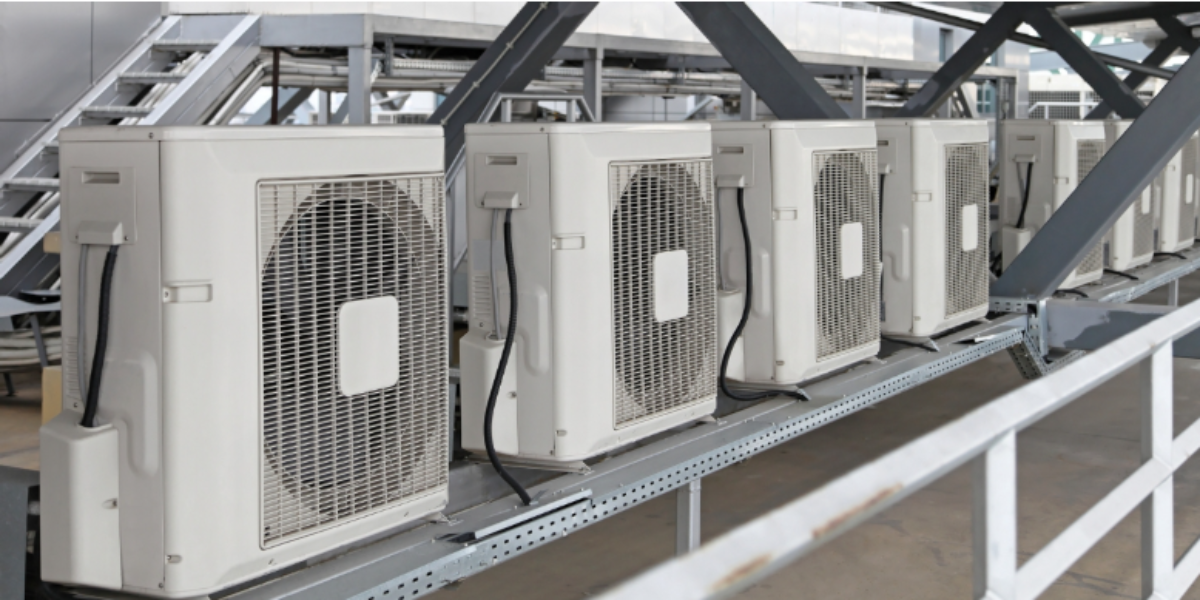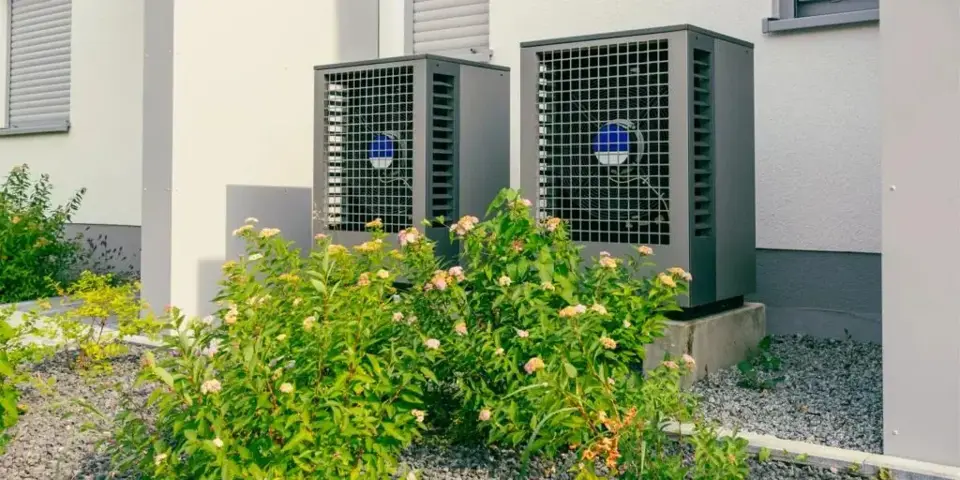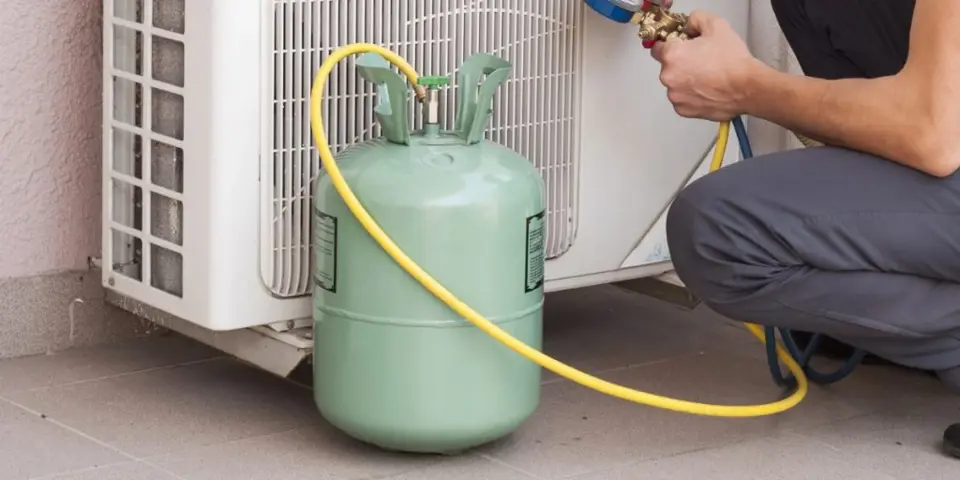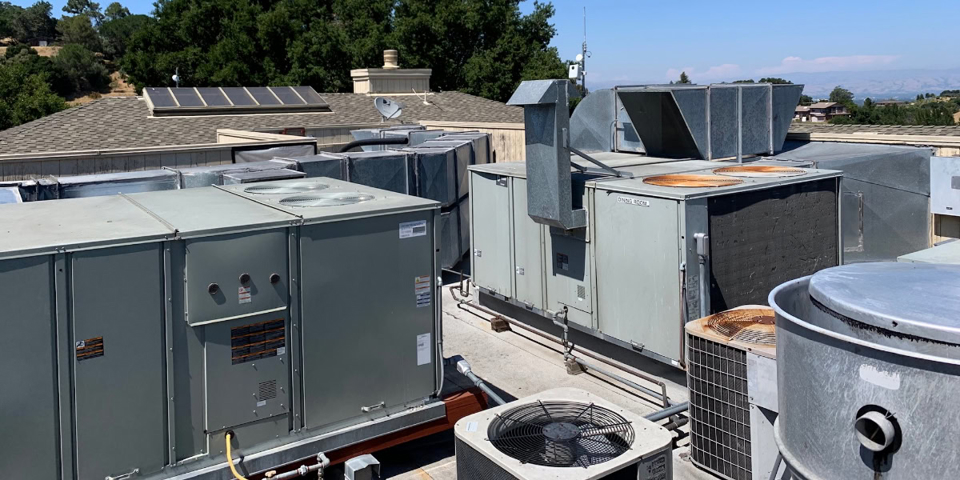Commercial HVAC systems are essential for maintaining comfort and air quality in businesses. No matter if you run a retail store, office, or restaurant, your HVAC system is key. It helps keep your space comfortable and efficient. Like any mechanical system, your HVAC needs regular maintenance. It’s important to keep it running well. This is especially true in commercial settings where systems work all the time.
Commercial HVAC preventive maintenance is a continuous process. It helps you extend your system’s life, avoid expensive breakdowns, ensure energy efficiency and is money saving. But what exactly does a commercial HVAC maintenance service include? This blog will break down what you can expect from regular HVAC maintenance and why it is vital for your business.
What is Commercial HVAC Maintenance?
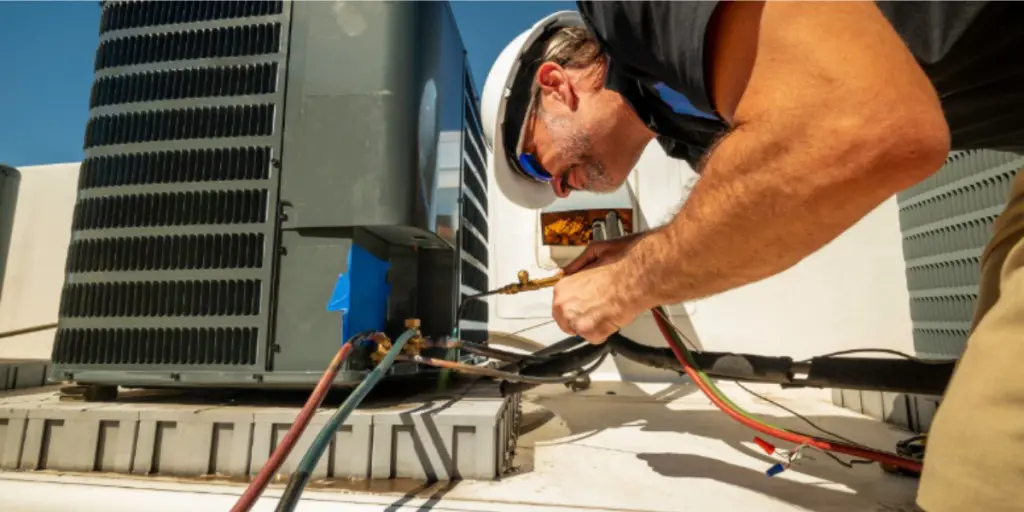
Commercial HVAC maintenance is a comprehensive service. It involves checking, cleaning, and optimizing your HVAC system parts. Regular maintenance keeps your system running well. This saves energy and helps avoid costly repairs.
An effective commercial HVAC maintenance service addresses all key parts of the HVAC system, ensuring that everything is running smoothly. Here are the core components typically included in a professional HVAC service.
1. Inspection of the HVAC System
A crucial part of commercial HVAC maintenance is a detailed inspection of the entire system. HVAC professionals will check the following components to ensure they are functioning as they should:
- Air filters: Clogged or dirty filters reduce airflow and efficiency. You should replace or clean the filters regularly.
- Air ducts: Inspect the ducts for leaks, dirt buildup, or blockages that could affect airflow.
- Thermostat: We need to calibrate the thermostat to ensure accurate temperature readings and control.
- Condensate drain: Over time, the condensate drain can become clogged, leading to water damage or reduced cooling.
- Refrigerant levels: The refrigerant in the air conditioning unit must be at the right levels to ensure proper cooling.
2. Cleaning of Coils and Condenser
Coils and condensers play an essential role in your HVAC system. The condenser releases heat from the refrigerant, while the coils absorb heat from inside your building. Over time, these components accumulate dirt and dust, which reduce their efficiency. As part of your commercial HVAC maintenance, you should clean these components to ensure the system runs effectively.
- Evaporator coils: If these coils are dirty, they can cause the system to freeze and lose cooling capability. Cleaning them restores efficiency.
- Condenser coils: Condenser coils are typically located outside the building. Dust, leaves, and debris can block airflow, which can overheat the system. Cleaning helps it run at full capacity.
3. Lubrication of Moving Parts
HVAC systems have various moving parts, such as fans and motors, that require lubrication to avoid wear and tear. Lack of proper lubrication can lead to friction, excessive heat, and, eventually, system failure. A commercial HVAC maintenance service includes lubricating all moving parts to ensure smooth operation. This step helps prevent costly breakdowns and extends the lifespan of your HVAC system.
4. Checking Refrigerant Levels
The refrigerant in your HVAC system is vital for the cooling process. If the refrigerant levels drop, the system will struggle to cool the air, leading to higher energy consumption and potential system damage. Regularly checking and recharging the refrigerant ensures that your HVAC system can maintain the desired temperature efficiently.
A low refrigerant level can be a sign of a leak in the system. If you find leaks during your HVAC services, make repairs immediately to avoid further damage.
5. Inspecting and Cleaning the Blower and Fan
The blower fan handles circulating air throughout the system. If the blower is dirty or malfunctioning, it can reduce airflow, causing the system to overheat and fail. As part of commercial HVAC maintenance, technicians will inspect and clean the blower and fan to ensure proper airflow and efficiency. This reduces energy costs and improves the overall comfort of your space.
6. Inspecting Insulation and Seals
Proper insulation and seals are crucial for an energy-efficient HVAC system. Over time, insulation can degrade, and seals can become worn, allowing air to escape or infiltrate. During commercial HVAC maintenance, technicians will inspect the insulation and seals around the system to ensure they are intact. Repairing or replacing these components improves efficiency and helps maintain consistent temperature control.
7. Calibrating the Thermostat
An incorrectly calibrated thermostat can cause your HVAC system to run inefficiently, either overcooling or overheating your space. Proper calibration ensures that the thermostat accurately reflects the desired temperature, which can reduce energy consumption. Technicians will check the calibration during HVAC services and make adjustments if necessary.
8. Inspecting System Control and Cycle
Your HVAC system has a series of control settings that ensure it operates as expected. During commercial HVAC maintenance, technicians will inspect the entire control system, including the sensors and circuit boards, to ensure everything functions correctly. This check includes verifying the system’s start-up, shutdown cycles, and any warning signals.
9. Testing for Proper System Operation
After the inspection and cleaning, the technician will perform a test run to ensure that the system operates correctly. They will check the temperature, airflow, and performance of the HVAC system to verify that everything is functioning at its best. If the test reveals any irregularities, we will make adjustments or repairs.
10. Energy Efficiency Check
Energy efficiency is a priority for most businesses. A well-maintained HVAC system can significantly reduce energy consumption, which lowers operational costs. During your commercial HVAC maintenance, the technician will evaluate your system’s energy performance and make recommendations for improvement. This may include adjusting settings, replacing outdated components, or upgrading to more efficient models.
Why Is Regular Commercial HVAC Maintenance Important?
Investing in regular commercial HVAC maintenance can help businesses in several key areas. Here’s why it’s crucial:
- Increased Efficiency: Routine maintenance keeps the system running at peak efficiency, reducing energy bills and extending the life of the equipment.
- Improved Air Quality: Regular cleaning and filter changes help improve indoor air quality by removing dust, allergens, and other pollutants.
- Cost Savings: Preventative maintenance reduces the chances of costly emergency repairs and extends the lifespan of your HVAC system.
- Compliance: Many businesses must adhere to certain building codes and health regulations. Regular maintenance ensures your HVAC system remains compliant.
- Reliability: With regular service, your HVAC system is less likely to break down during peak seasons, preventing unexpected disruptions to your business operations.
How Often Should You Schedule Commercial HVAC Maintenance?
The frequency of maintenance depends on the type of HVAC system, its age, and the environment in which it operates. Technicians should service commercial HVAC systems at least twice a year once in the spring to prepare for summer cooling and once in the fall to prepare for the heating season. Businesses with more complex or high-use systems may require more frequent service.
Conclusion:
R&R Refrigeration & Air Conditioning offers expert HVAC services for businesses of all sizes. Our HVAC maintenance services keep your system running smoothly. This means comfort and efficiency all year long. Schedule your maintenance service today and enjoy peace of mind knowing your HVAC system is in good hands.
By investing in commercial HVAC maintenance, you can avoid costly repairs and extend the lifespan of your HVAC system. Don’t wait for the system to fail. Keep your business comfortable and efficient with regular HVAC services.
FAQs About Commercial HVAC Maintenance
Q1: How often should I schedule commercial HVAC maintenance?
A1: It’s recommended to schedule commercial HVAC maintenance at least twice a year: once before summer and once before winter.
Q2: Can regular maintenance improve energy efficiency?
A2: Yes, regular maintenance keeps the system running at peak efficiency, which can reduce energy consumption and lower utility costs.
Q3: What happens if I neglect regular HVAC maintenance?
A3: Neglecting maintenance can lead to reduced system efficiency, higher energy bills, frequent breakdowns, and costly repairs.
Q4: What components are inspected during HVAC services?
A4: HVAC services typically include inspecting the thermostat, filters, coils, fans, refrigerant levels, insulation, and seals.
Q5: How can I tell if my HVAC system needs repairs?
A5: Signs that your HVAC system needs repairs include inconsistent temperatures, poor airflow, strange noises, or increased energy bills.


